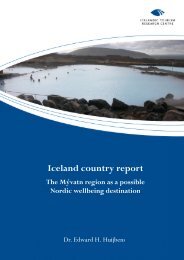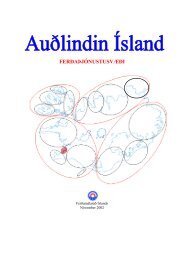Untitled
Untitled
Untitled
Create successful ePaper yourself
Turn your PDF publications into a flip-book with our unique Google optimized e-Paper software.
een done. This offsetting could, for example, be the gross planting of<br />
forests. As one of the advocates of green capitalism put it:<br />
We’ve put Earth at the brink of climate calamity, thanks to rapid<br />
industrialisation and market forces. That’s part one. The sequel is<br />
how to get out of this fix. I believe it’s those same forces, innovation<br />
and profit – and nothing else – that can stop global warming (Fred<br />
Kupp cited in Prudham 2009, p. 1595).<br />
Yet, it is difficult to resist thinking this as “greenwashing” economic<br />
growth that at its core has been, and still is, dependent upon fossil fuels<br />
and other resource usages. As Gunder and Hillier suggest:<br />
rather than encouraging opportunities for social change that might<br />
comprehensively reduce consumer behaviour to those consistent with<br />
the earth’s carrying capacity, the narrative of sustainable development is<br />
often deployed simply to further the interests of an entrepreneuriallysupportive<br />
state and institutions. This last is a pro-market interpretation<br />
of sustainable development, consistent with Smart Growth and<br />
globalisation, that dilutes the concept of sustainability to literally<br />
‘business as usual’, with, at best, an objective to partially reduce urban<br />
consumer energy consumption and waste outputs, while maximising the<br />
potential for economic growth with little regard to overall resource<br />
depletion (Gunder and Hillier 2009, p. 136).<br />
It may be true that “current business and destination level<br />
environmental initiatives generally fail to address tourism-induced<br />
contributions to broader global climatic and environmental changes”<br />
(Williams and Ponsford 2009, p. 403), but times of crisis are also times of<br />
opportunity, perhaps also for climate change. The financial meltdown has<br />
led to a renaissance in public responsibility in a situation where all<br />
“governments face deep dilemmas in reconciling climate change and<br />
energy policy with sustaining popular support, especially in times of<br />
economic difficulty” (Giddens 2009, p. 230).<br />
While many of these measures follow conventional lines of what<br />
may be distinguished as unsustainable tourism practices, there is a growing<br />
awareness for the need for active policies to create more sustainable<br />
tourism practices. “Green recovery”, a global “Green New Deal”, and a<br />
“green energy revolution” are catch phrases that now find their way into<br />
governance and policy making. In 2010 the United Nation's Millennium<br />
Development goals will be a decade old. At present carbon off-setting is in<br />
an embryonic stage of usage by the tourism industry and tourists and<br />
81
















